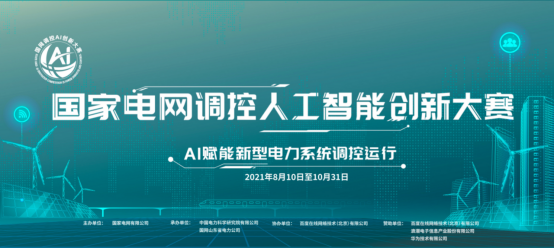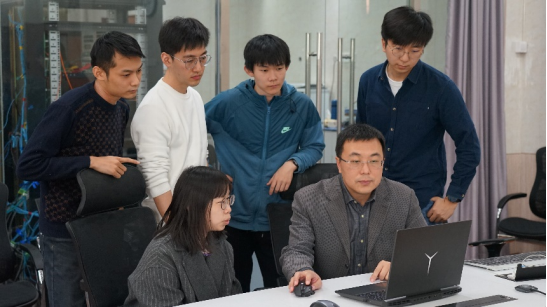
On December 17, 2021, the final result of the “StateGrid Control Artificial Intelligence Innovation Competition” were officially announced at the annual meeting of the Chinese Societyfor Electrical Engineering. “Tsinghua THEMS”, ateam from the Department of Electrical Engineeringand Applied Electronicsof Tsinghua University, won the runner-upat Track 4 (Smart Arrangement of Grid Operation Organization) (out ofmore than 510 participating teams in total), and wonthe fifthat Track 3 (New Energy Power Generation Forecast)(out of more than1,120 participating teams), which are both thebest resultsforcolleges and universitiesat the two tracks.The teamis also the only team among the 2,580 participating teams in the entire competition to enter the top six on the two tracks and winprizes.The teammembersareDr. Zhou Yanzhen and four doctoral students Zeng Hongtai, Wang Zhengcheng, Lan Jian, and Zhang Yuqian, and the instructors are Professor Guo Qinglai and Professor Sun Hongbin.

THEMS team members and the instructorwerediscussingthe competition
This competition was hosted by the State Grid Corporation of China to build the foundation of artificial intelligence application in thecontrolfield andexplore the technical solutions of artificial intelligenceforsolving power grid operation problems.A total offour tracks were set, namelypower grid station wiring diagram identification, intelligent retrieval of grid operation information, new energy power generation forecast, and intelligent arrangement ofgrid operation organization. Each trackprovided 1 first prize, 2 second prizes, and 3 third prizes. Since the start of the competition, it had attracted thousands of teams fromdomestic and foreignpower companies, universities, scientific research institutions, and technology companies, including more than 100 universities and 300 Internet companies. It isone of the most influentialartificial intelligence competitions with the most participants held in China.
Track 4 aims to explore the fusion application of power systemtide currentcalculation and reinforcement learning, participants use the new power system SG-126 node network model for AI learning and training, apply power flow calculation evaluation to correct AI calculation results, and iterate for optimization to provide a new solution for theoperationorganization.Thistrack involves withthe challenge of large decision space and heterogeneous control variables, and thusthe THEMS team proposed a model-data-knowledge collaboration-driven power system operation arrangement structure, which effectively reduces the difficulty of exploring large heterogeneous decision spaces, solves the problem of long exploration time and poor convergencein anysingle artificial intelligence method, and improves the applicability of the agent in different scenarios.
Track 3 aims to use deep neural networks and other technologies to build new energy power generation prediction feature projects, build refined prediction models, and improve new energy power generation forecast through various types of data such as weather forecasts, weather conditions, station output, operating limits, etc. The track, which has attractedthemostparticipants and teams in the competition, is involved witha variety of actual new energy power plants, closely related to actual application scenarios, extensivedata sources, greatuncertaintyand high difficulty in prediction. The THEMS team proposed a new energy prediction method that combines integrated learning and manual experience, which significantly improves the prediction accuracy of the model in new scenarios.
All the members of THEMS come from the dispatch automation research team of the Department of Electrical Engineeringand Applied Electronicsof Tsinghua University. The team, with more than30 years ofexperience in the research on power grid control centers,is one of the most influential research teams in thefieldof power grid energy management and dispatch control inChina, and it has wonthe first prize of National Science and Technology Progress Award,thesecond prize of National Technology Invention Award andthe second prize of National Science and Technology Progress Award each, and was selected into teams of Top Ten Technology Progress of Chinese Colleges and Universities for twice. In recent years, the team hasattached great importance to the combination of artificial intelligence technology and power grid dispatching, achieved a series of important researchachievements, andundertakensomenational key research and developmentprojects and a number of practical engineering projects in related fields.

















 News & Events
News & Events